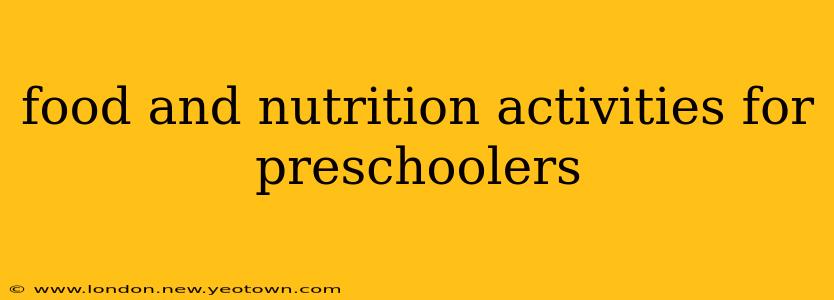Preschool is a crucial time for developing healthy eating habits. It's a period of rapid growth and development, and establishing a positive relationship with food sets the stage for a lifetime of healthy choices. But getting preschoolers excited about nutritious food can feel like a monumental task. Forget the power struggles; let's explore some fun and engaging activities that make learning about food and nutrition an adventure!
This isn't just about teaching them what to eat; it's about fostering a sense of curiosity and exploration around food, making healthy choices feel exciting, and setting the foundation for lifelong healthy habits.
What are some fun food-related activities for preschoolers?
This is where the magic happens! We can transform the mundane into the marvelous with a little creativity. Think beyond the typical coloring page. Let's engage all their senses and turn nutrition into a playful experience.
Sensory Exploration:
- Mystery Bags: Fill opaque bags with different fruits and vegetables. Children can feel the textures, guess what's inside, and then reveal the contents to discuss their shapes, colors, and smells. This encourages them to engage with a wider variety of produce beyond their usual favorites.
- Taste Test Tuesdays (or any day!): Introduce new flavors in a fun, non-pressured way. Offer small samples of different fruits and veggies and let them describe the taste – is it sweet, sour, crunchy, soft? Avoid pressure; the goal is exploration, not forced consumption.
- Food Art: Use fruits, vegetables, and other healthy snacks to create edible art. Think veggie faces, fruit rainbows, or even a healthy pizza masterpiece. This transforms snack time into a creative outlet.
How can I make healthy eating fun for preschoolers?
Making healthy eating fun is all about creativity and positive reinforcement. Avoid using food as a reward or punishment; instead, frame healthy eating as a fun adventure.
Games and Activities:
- Grocery Store Role Play: Set up a pretend grocery store using toy food and let children choose their healthy "purchases." This helps them familiarize themselves with different healthy food options and practice making choices.
- "Grow" Your Own Vegetables: Even a small herb garden on a windowsill can be exciting! Watching something grow from a tiny seed fosters an appreciation for where food comes from.
- Healthy Snack Bingo: Create bingo cards with pictures of healthy snacks. Call out the snacks, and the first child to get bingo wins a small prize (not necessarily food related!).
What are some healthy eating habits for preschoolers?
Establishing healthy eating habits from a young age is crucial. It's not about restriction; it's about balance and moderation.
Key Habits:
- Regular Mealtimes: Consistent meal and snack times help regulate appetite and prevent overeating.
- Variety is Key: Offer a range of fruits, vegetables, whole grains, and lean protein throughout the week.
- Involve Them in Meal Prep: Let children help wash vegetables, stir ingredients, or set the table. This increases their interest in the food and helps them understand the process.
- Limit Sugary Drinks: Offer water or milk instead of juice or soda.
- Positive Role Modeling: Children learn by observing their parents and caregivers. Show them that you enjoy eating healthy foods.
What are some creative ways to get preschoolers to eat their vegetables?
Getting preschoolers to eat their veggies can be a challenge, but we can make it fun!
Creative Approaches:
- Veggie Sticks with Dips: Serve veggies with hummus, guacamole, or yogurt dips for extra appeal.
- Hidden Veggies: Puree vegetables into sauces or add them to familiar dishes like meatballs or macaroni and cheese.
- Fun Shapes: Use cookie cutters to make fun shapes out of sandwiches or pancakes incorporating vegetables.
- Colorful Plates: A visually appealing plate can make a big difference.
How can I teach my preschooler about healthy foods and nutrition?
Teaching about healthy foods and nutrition doesn't have to be a lecture. Make it interactive and engaging!
Educational Approaches:
- Books: Read age-appropriate books about healthy eating and the importance of fruits and vegetables.
- Songs and Rhymes: Create or find songs and rhymes about healthy foods.
- Field Trips: Visit a farmer's market or a local farm to see where food comes from.
- Cooking Together: Involve your preschooler in simple cooking activities.
Remember, consistency is key. Keep it fun, keep it positive, and celebrate small victories. By making healthy eating a positive and enjoyable experience, you can help your preschooler develop a lifelong love for nutritious food!

